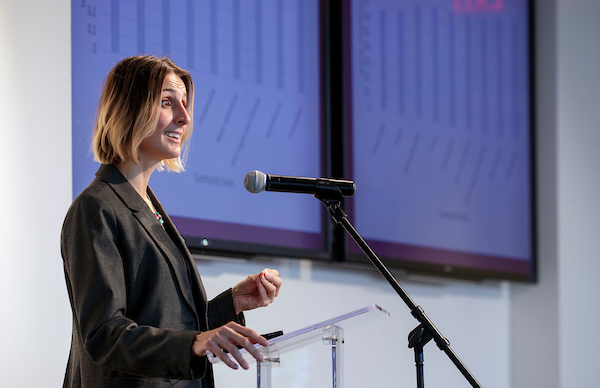Glazier Shares Advice on Student Engagement, Teacher Burnout in Chronicle of Higher Education Forums

Dr. Rebecca Glazier, a professor in the School of Public Affairs at UA Little Rock, is sharing her expertise on student engagement and teacher burnout in two virtual forums hosted by the Chronicle of Higher Education.
“I am happy to be able to contribute to this important conversation,” Glazier said. “I see it as part of my service contribution as a faculty member at UA Little Rock and doing research that serves the public good. I am always excited to help other professors around the country connect with their students and engage with them online.”
The Chronicle of Higher Education contacted Glazier after the publication of her book, “Connecting in the Online Classroom: Building Rapport Between Teachers and Students.”
She wrote an article for the Chronicle of Higher Education in June 2022 when the publication ran a six-part series about how to solve the student disengagement crisis, or the problem of students not participating in their classes.
Glazier participated in the first Chronicle of Higher Education virtual forum, “How to Reach the Disengaged Student,” on Jan. 20. The panelists discussed the challenge of how engaging students has hit faculty members hard in the last few years, how remote instruction left many students feeling stressed out and disconnected, and how faculty members can make class time more meaningful and better support students. Senior writer Beckie Supiano wrote an article about the session here.
“A lot of people are worried about students being disengaged right now – not showing up to class or being checked out when they do show up,” Glazier said. “Professors should take the initiative to establish a relationship and build rapport with their students. Sometimes, that can be things that aren’t content related, like having students introduce themselves and talk about what is going on in their lives. That helps students connect with each other as real people and build rapport with one another. I try to emphasize this idea of it being mutually beneficial for students and professors to build relationships and when professors make the students feel like they care about their success.”
The next Chronicle of Higher Education virtual forum featuring Glazier as one of the panelists will take place at 2 p.m. Feb. 10. Senior writers Beth McMurtrie and Beckie Supiano will interview expert guests about making class time more meaningful and supporting students without burning yourself out.
“It will focus on faculty burnout and how it can sometimes take a lot out of faculty to use high-engagement strategies to work with students,” she said. “One of the funny things we talked about in the first webinar is a professor who made guacamole for a student who got the best answer in class. That is a crazy, fun thing that makes students want to come to class. But trying to think of fun, entertaining, crazy things can take a lot out of you.”
Glazier said that professors who build a good classroom community with their students will experience less burnout from teaching.
“What I want to emphasize is that when you build a classroom that feels like a community, that it is fulfilling for both the professor and students,” she said. “Instead of being drained by the energy it takes to teach, you have a more fulfilling experience when you are engaged with your students. That can help improve the teaching and learning experience for everyone.”
The virtual forums are open to subscribers of the Chronicle of Higher Education’s weekly Teaching newsletter. Those interested can sign up for the newsletter via this link.
